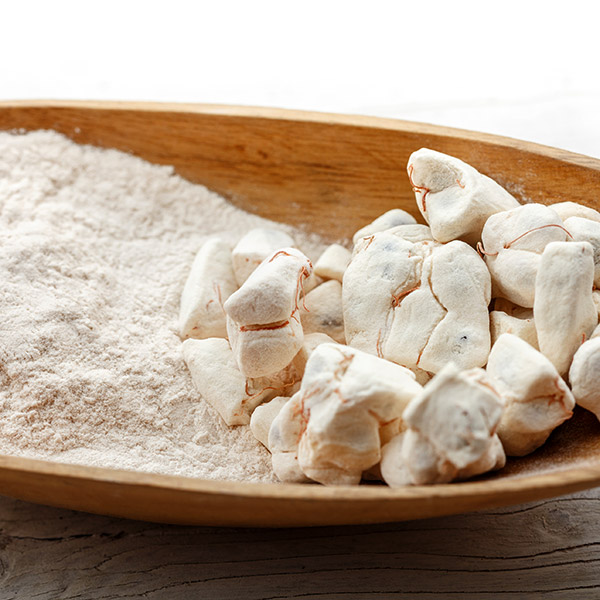
Many people around the globe rely on a daily regime of synthetic supplements and vitamins due to the inability to get their recommended daily allowances (RDA) from diet alone. But, which is the better, synthetic or whole-food natural vitamins?
In the US alone, a study (1) showed without enrichment and/or fortification and supplementation, many Americans did not achieve the recommended micronutrient intake levels. But even-though dietary supplements are a huge part of the global health and wellness industry ($123.28 billion in 2019) (2) do they provide the correct amounts of essential nutrients needed and are they in the right form for effective absorption? Are whole food sources of natural vitamins and minerals as a balanced diet a better option for intake and bioavailability?
What are synthetic vitamins?

Synthetic vitamins, also known as ‘isolated nutrients’, refers to nutrients that are made using an industrial process, instead of being part of an existing plant or food source. The majority of the supplements on the market today are synthetic and a study (3) has shown that currently over half of the population of the US takes a synthetic vitamin, such as a multi-vitamin, daily. Despite their origins, the widely accepted view is that synthetic vitamins are chemically identical to those found in whole foods.
However, despite the identical chemical make-up, because of major differences in the production process (industrial vs natural) and the absence of accompanying compounds found in the whole-food form, the body may react differently when absorbing the factory-made alternative. Additionally, despite the labels, a large number of supplements are unregulated by a third party making accurate doses difficult to guarantee. Research (4) highlights that due to inadequate regulation ‘supplements may be adulterated with dangerous compounds, be contaminated, fail to contain the purported active ingredient, or contain unknown doses of the ingredients stated on the label; be sold at toxic dosages; or produce harmful effects as a result of their interaction with other drugs’.
What are whole-food natural vitamins?
Whole-food natural vitamins are nutrients that can be found from natural sources, such as the large amount of vitamin C (84% to more of RDA) (5) in the Baobab fruit or vitamin D absorbed from sunlight. Fruits and vegetables are the main source of natural vitamins as well as other essential compounds such as fiber and minerals.
According to one report (6) by Mayo Clinic, whole foods contain benefits that are unmatched by synthetic supplements, such as greater nutrition due to the complementary mix of natural vitamins, minerals and other compounds, essential fiber content and phytochemicals, naturally occurring food substances that could protect against disease. Studies (7) have shown due to the presence of other supporting compounds, the bioavailability of vitamins in whole food sources, i.e. how easy it is for the body to absorb and use, is higher than in synthetic supplements.
This has been described by one Doctor (8) as “ When you remove a vitamin part from the whole food form, you get fractionated pieces of the whole, but that has consequences. Nature intended for you to consume food in WHOLE form because all the natural vitamins, minerals, antioxidants and enzymes together work synergistically to give your body the nutrition it requires for optimal health…You get the best bioavailability in whole food form.”

One limitation (6) of getting all natural vitamins from whole food sources would be for those who have dietary restrictions due to diet choices or allergies. For example, many vegans have to take a vitamin B12 supplement as it is primarily obtained from meat and dairy products.
One of the most important natural vitamins to consumers and food producers alike, especially during and after the coronavirus crisis, is the immune-boosting vitamin C. As one study (9) shows natural vitamin C has many benefits for the body, from being an antioxidant, reducing potentially harmful free radicals to boosting the production of phagocytes and lymphocytes, white blood cells essential for protecting the body from infection, as shown by this research. (10) The immune-boosting properties made it a possible treatment source for the coronavirus, with trials to demonstrate its effectiveness, taking place in China.
This essential natural vitamin has been shown to be extremely effective when consumed from a whole food source with one study (11) concluding that ‘ingesting vitamin C as part of a whole food is considered preferable because of the concomitant consumption of numerous other macro- and micronutrients and phytochemicals, which will confer additional health benefits.’
One particularly rich natural source of vitamin C is the Baobab fruit. The fruits pulp has very high vitamin C content (280–300 mg per 100 g), which is seven to ten times that found in oranges (51 mg per 100 g) as shown in this study. (12) The same report showed that the high concentration of vitamin C contributes to the fruit’s other reported benefits of being antimicrobial, anti-inflammatory, antimalarial, antidiarrheal, antiviral, and antioxidant. (13) Along with high levels of the vitamin, the pulp alone also contains significant quantities of calcium, phosphorus, carbohydrates, fibers, potassium, proteins and lipids as shown here. (12)
Baobab Pulp: 280 – 300mg per 100g
Orange Pulp: 50mg per 100g

The Baobab tree itself is extremely multi-purposed (14) with its bark being used to make ropes and baskets and the seeds, bark and leaves all being used as treatments for ‘almost any disease’ such as malaria, tuberculosis, fever, infections, diarrhea, anemia, toothache, and dysentery.
The many benefits of the Baobab fruit make it a perfect source of vitamin C and other natural vitamins and minerals for food products. As well as the added nutritional value the fruit has also been shown in a study (15) to help curb hunger cravings and improve digestive health, potentially due to its high fiber and polyphenol content, it can also help control blood sugar (16) levels, and reduce inflammation. (17)
Before the recent coronavirus crisis, the increase in health awareness by consumers saw the market for vitamin C ingredients increase to $2.1billion (18) in 2019 making it an important factor in any new/reformulated food product. With immunity-boosting ingredients now at the front of everyone’s mind, there has never been a better time to make the Baobab fruit the primary source of natural vitamin C in trail mixes, cereals, chocolate, and snacks.
(1) https://www.ncbi.nlm.nih.gov/pubmed/21865568
(2) https://www.grandviewresearch.com/industry-analysis/dietary-supplements-market
(3) https://www.ncbi.nlm.nih.gov/pubmed/21592424
(4) https://www.ncbi.nlm.nih.gov/pmc/articles/PMC4330859/
(5) https://www.ncbi.nlm.nih.gov/pubmed/19093269
(6) https://www.mayoclinic.org/documents/mc5129-0709-sp-rpt-pdf/doc-20079085
(7) https://journals.sagepub.com/doi/full/10.1177/2397847317696366
(8) https://www.everydayhealth.com/columns/jackie-arnett-green-plate-special/are-vitamin-supplements-really-bioavailable/
(9) https://www.ncbi.nlm.nih.gov/pmc/articles/PMC3783921/
(10) https://www.ncbi.nlm.nih.gov/pubmed/25157026
(11) https://www.ncbi.nlm.nih.gov/pmc/articles/PMC3847730/
(12) https://www.sciencedirect.com/science/article/pii/S222116911530174X
(13) https://www.medicalnewstoday.com/articles/301506.php
(14) https://www.medicalnewstoday.com/articles/306445#benefits
(15) https://www.ncbi.nlm.nih.gov/pubmed/28413912
(16) https://www.ncbi.nlm.nih.gov/pubmed/24176228
(17) https://www.ncbi.nlm.nih.gov/pubmed/269135
(18) https://www.futuremarketinsights.com/press-release/vitamin-c-ingredients-market
Let’s Talk About Whole-Food Natural Vitamins
If you are developing a supplement or food product that calls for high levels of whole-food natural Vitamin-C and would like the added benefit of prebiotic dietary fiber, let’s talk.
